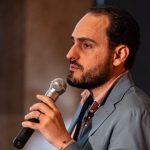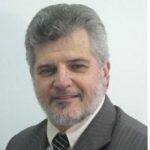
Ivo Barbi
Federal University of Santa Catarina,
Santa Catarina, Brazil
Ivo Barbi (Life Fellow, IEEE) received the B.Sc. and M.Sc. degrees in electrical engineering from the Federal University of Santa Catarina (UFSC), Florianópolis, Santa Catarina, Brazil, in 1973 and 1976, respectively, and the Dr.-Ing. degree in electrical engineering from the Institut National Polytechnique de Toulouse, Toulouse, France, in 1979. He founded the Brazilian Power Electronics Society, and the Brazilian Power Electronics Conference in 1990. He is currently a Researcher at the Solar Energy Research Center in Florianópolis, and a Professor Emeritus of Electrical Engineering at UFSC. Dr. Barbi was a recipient of the 2020 IEEE William E. Newell Power Electronics Award. He was an Associate Editor of IEEE TRANSACTIONS ON INDUSTRIAL ELECTRONICS and IEEE TRANSACTIONS ON POWER ELECTRONICS for several years.
A Loss-Free Resistor Approach to Averaged Modeling of PWM DC-DC Converters in Discontinuous Conduction Mode.
A simple method is presented to averaged reduced-order modeling of hard-switching pulse-width modulated (PWM) direct current to direct current (DC-DC) converters operating in discontinuous conduction mode (DCM). The studied method can also be used to averaged modeling of any DC-DC converter that can be represented by an equivalent circuit utilizing a loss-free resistor (LFR), whether operating in continuous or discontinuous conduction mode. The models obtained using the proposed method are identical to those obtained using conventional methods, such as state-space averaging and the PWM switch. The technique is based on the concept of a loss-free resistor (LFR).
IVO BARBI (Life Fellow, IEEE) received the B.Sc. and M.Sc. degrees in electrical engineering from the Federal University of Santa Catarina (UFSC), Florianópolis, Santa Catarina, Brazil, in 1973 and 1976, respectively, and the Dr.-Ing. degree in electrical engineering from the Institut National Polytechnique de Toulouse, Toulouse, France, in 1979.
He founded the Brazilian Power Electronics Society, and the Brazilian Power Electronics Conference in 1990. He is currently a Researcher at the Solar Energy Research Center in Florianópolis, and a Professor Emeritus of Electrical Engineering at UFSC.
Dr. Barbi was a recipient of the 2020 IEEE William E. Newell Power Electronics Award. He was an Associate Editor of IEEE TRANSACTIONS ON INDUSTRIAL ELECTRONICS and IEEE TRANSACTIONS ON POWER ELECTRONICS for several years.

Thierry A. Meynard
Université de Toulouse
Toulouse – France
Thierry A. Meynard graduated from the École Nationale Supérieure d’Électrotechnique, d’Électronique, d’Hydraulique de Toulouse (ENSEEIHT) in 1985. He obtained his Ph.D. from the Institut National Polytechnique de Toulouse in 1988 and subsequently worked as a visiting researcher at the Université du Québec à Trois-Rivières, Canada, in 1989. He joined the Centre National de la Recherche Scientifique (CNRS) as a full-time researcher in 1990 and currently holds the position of Directeur de Recherches at LAPLACE (Laboratoire Plasma et Conversion d’Energie), as well as the title of IEEE Fellow. In parallel with his academic career, Thierry A. Meynard has been strongly involved in industrial collaboration and technology transfer. From 2000 to 2016, he worked as a part-time consultant for CIRTEM. He also founded Power Design Technologies, the company behind PowerForge, a software tool for designing two-level and multilevel power converters, later acquired by Gamma Technologies. Since January 2020, he has been working as an independent consultant, continuing to promote the transfer of innovations into industrial applications. T. A. Meynard is co-inventor of several multilevel converter topologies that have been adopted by major industrial players such as ABB, Alstom, CIRTEM, General Electric, and Schneider Electric. These include the Flying Capacitor, Stacked Multi-Cell, 5L-ANPC, AC/AC Chopper, and xPlexed Chopper topologies.
Methods and Tools for the Design of Multilevel Converters
Over the past decades, growing climate concerns have positioned electric energy as a central pillar of the energy transition. During this time, multilevel converters have evolved from a novel concept to a well-established technology, now available in industrial products across every power range from 1 W to 10 MW. Selecting the optimal semiconductor device has become increasingly challenging. The choice is no longer solely determined by the voltage and current requirements: devices with lower voltage or current ratings can be connected in series or in parallel to create multilevel converters with enhanced performance offering better efficiency, higher power density, and/or lower cost. To support engineers in making the best design decisions, dedicated methods and specialized tools have been developed. These include a unified formalism for series, parallel, and series-parallel multilevel converters that enables analytical models for early-stage design, standardized simulation models to simplify waveform comparisons, and a modular approach to prototype construction.
This talk will present a range of design tools spanning various levels of complexity and accuracy that assist designers at different stages of the converter development process.

Sigurd Skogestad
Norwegian University of Science and Technology,
Trondheim, Norway
Sigurd Skogestad is a Professor of Chemical Engineering at the Norwegian University of Science and Technology (NTNU), where he has been a central figure in process systems engineering for over three decades. Internationally recognized as one of the foremost experts in process control, Professor Skogestad’s research focuses on plantwide control, self-optimizing control, model predictive control (MPC), and separation processes. His pioneering contributions to the development of control structures and operational strategies for complex chemical processes have had a major impact on both academic research and industrial practice.
He holds a PhD from the California Institute of Technology (Caltech), and has authored over 300 scientific papers and the widely cited textbook Multivariable Feedback Control: Analysis and Design. With an h-index above 75 and more than 25,000 citations, his work is considered foundational in control engineering. He has supervised over 60 PhD students and actively collaborates with both academic institutions and industry, especially within the oil and gas sector and sustainable process design.
Professor Skogestad has received several prestigious awards, including the Nordic Process Control Award and the IFAC Award for Excellence in Process Control. He is a member of the Norwegian Academy of Technological Sciences and frequently serves as a keynote speaker at international conferences.
Advanced control for the future
Advanced control refers to any control strategy that goes beyond basic single-loop PID control. It becomes necessary for processes involving multiple inputs, changing objectives or constraints, additional measurements, or measured disturbances. Many engineers intuitively think, “This is getting complicated—we need a model and optimization (e.g., MPC).” However, model-based control is often expensive to implement and highly sensitive to model uncertainty. Fortunately, there is a more robust yet less appreciated alternative: advanced PID architectures. These rely primarily on measurements (data) and feedback and consist of smart combinations of PID controllers with simple elements such as cascade control, selectors, split-range control, and ratio control. My prediction: The future of advanced control will continue to be built on these simple PID architectures—just as they are today—despite having been largely neglected by academia for the past 80 years. Model-based control (e.g., MPC) will be added on top in specific applications, such as for strongly coupled processes or when future disturbances are known. Machine learning and AI (including tools like ChatGPT) are unlikely to be used extensively for real-time control, except in soft sensor (estimation) tasks. However, they will become important tools for offline tasks such as model development, software generation, control architecture design, and controller tuning.

Mariana Netto
Univ. Gustave Eiffel,
Versailles, France
Mariana Netto is Tenured Researcher in the Université Gustave Eiffel, France at the COSYS-PICSL Laboratory. She obtained her French Senior diploma HDR in 2013, and her PhD degree in automatic control, in collaboration with the Massachusetts Institute of Technology, from CentraleSupélec/Paris-Saclay University, France, in 2001. She has also been assistant professor within the Paris-Saclay University for one year before integrating the Université Gustave Eiffel. She is an Electronic and Automatic Control Engineer from the Rio de Janeiro Federal University – Brazil. Among her international research activities, Mariana Netto has led her university in the European Network of Excellence HYCON2 and she is serving as chair of the IFAC Technical Committee 9.2 Systems and Control for Societal Impact, since 2020. She has also contributed to the international scientific community through the IFAC IEEE CPHS (Cyber-Physical & Human Systems) event, having served as IPC co-Chair to its first edition in Paris. And then as General Chair to the IFAC IEEE CPHS 2016, in Florianopolis, Brazil. After this, the IFAC IEEE CPHS 2018 has been held in Miami, US, led by the MIT and NSF, when she has served as member of the Advisory Board and she serves since 2019 as member of the CPHS Steering Committee. Mariana Netto belongs to the roll of honor of the laureates of IFAC France, as recipient of the IFAC Service French Award in 2018 for this work. Her research interests are on linear and nonlinear control and she has been working in nonlinearly parametrized, hybrid and piecewise linear control for improved vehicle’s safety, on intelligent transportation systems and more recently in the control of micro-grids. She believes in the increasing need for interdisciplinary collaboration following the recent enormous technological advances following the world digital revolution.
Increasing automation levels in advanced driving assistance systems (ADAS) in multiple time scales, human in the loop levels, and control challenges
The huge advances in technology following the digital revolution in the last 30 years have allowed impactful new possibilities in terms of embedded systems in the vehicle for assisting the driver in increasing automation levels towards increased road safety, in the direction of full automation. Related human-machine cooperation studies have been evolving accordingly and there has been the need to revise the international treaties on road traffic. This talk aims to give a deep understanding of ADAS and the control challenges involved in a cross disciplinary analysis. The structure of driving assistance systems in a classification of three groups, defined in previous European projects on road safety, based on the time to a potential accident is revised. It is discussed each of these three groups, in terms of the underlying key challenges in the control design, non-linear and linear, the cognitive capacities of the driver, to relate technical and human parameters. Finally, the amendments in the international treaties on road traffic, effectuated following the introduction in the market of these systems are highlighted and analyzed in relation with the previous studies.

Fernanda De Morais Carnielutti
Federal University of Santa Maria
Santa Maria, Brazil
She received her Bachelor degree in Electrical Engineering in 2010, from the Federal University of Santa Maria, UFSM, Brazil. During her undergraduation studies, she worked with wind power at the Power Electronics and Control Research Group, GEPOC, at UFSM. She received her Master and Doctor degrees in 2012 and 2015, respectively, from the same university She received scholarships from the brazilian government agencies CNPq (National Counsel of Technological and Scientific Development) from 2007-2010 as an undergraduation student, from CAPES (Coordination for the Improvement of Higher Education Personnel) from 2010-2012 during her Master Degree, and from CNPq again, from 2012-2016 during her Doctorate and Post-Doctorate studies. Se was chair of the UFSM IEEE Student Branch and of the UFSM IEEE IAS SB Chapter. She was Professor at the Federal University of Santa Maria, UFSM – Campus Cachoeira do Sul, from 2016 to 2018 . Currently, she is Professor at the Federal University of Santa Maria, UFSM – Campus Santa Maria, researcher at the Power Electronics and Control Group – GEPOC, Permanent Professor at the Graduate Program on Electrincal Engineering – PPGEE at UFSM, and member of the of the IEEE Power Electronics, IEEE Industrial Electronics and IEEE Industry Application Societies, as well as of the Brazilian Society of Power Electronics (Sobraep). Her research interests include control and modulation of static power converters, multilevel converters, power electronics for renewable energies, microgrids and model predictive control.
Model Predictive Control for Grid-Tied Converters and Microgrids
Finite Control Set Model Predictive Control (FCS-MPC) is being increasingly considered as an attractive control strategy for power electronics systems, including grid-tied inverters and microgrids. Some of the main advantages of FCS-MPC are its simple concept and implementation, the possibility to easily include multiple control objectives, non-linearities and system constraints in its formulation, fast transient performance and robustness. However, FCS-MPC has some disadvantages, such as variable switching frequency, widespread harmonic content, dependency on model parameters and high computational burden for multilevel inverters. Therefore, improved MPC strategies are being proposed in the literature to deal with the aforementioned limitations of FCS-MPC. In this context, this talk will briefly explain the basic concepts of FCS-MPC applied to grid-tied inverters (including grid-following and grid-forming inverters) and microgrids and will present some improved MPC formulations to tackle the drawbacks of the classical FCS-MPC strategy. The goal of this talk is to present MPC to the audience and motivate new innovative developments on this exciting research field.

Gilney DAMM
Univ. Gustave Eiffel, Marne-la-Vallée, France
Versailles, France
Gilney Damm received the bachelor’s degree in electronic engineer from COPPE-Rio de Janeiro Federal University (UFRJ), Rio de Janeiro, Brazil, in February 1995, the M.Sc. degree from UFRJ, Rio de Janeiro, Brazil, in 1997, the Ph.D. degree from the Supelec/Université Paris Sud, Orsay, France, in 2001, and the Habilitation à Diriger des Recherches from Evry University, Évry-Courcouronnes, France, in 2010. He is currently an Associate Professor with the Laboratory L2S, Paris-Saclay University. His main research interests include the nonlinear control of power systems (SmartGrids-SuperGrid-MicroGrids, applications are in the field of large scale renewable energy integration, multi-terminal HVdc systems, variable speed pumped storage plants, mixed ac/dc grids, smartcities and smartgrids; control of power generators (transient stabilization, frequency and voltage stability, synthetic inertia), synchronization of power networks, microgrids. He is currently partner of the Energy Transition Institute (ITE) Efficacity, where he is leading Scientist of the Urban SmartGrids pole. He is also partner of the ITE SuperGrid. He is Co-Leader of the French research forum on SmartGrids, sub-topic leaderon the France-Singapour network on SmartGrids and partner of the International Associated Laboratory (LIA-CNRS) SmartGrids with Canada and PowerGrids with Brazil. He is a member of the IFAC Technical Committee TC 6.3 Power and Energy Systems and an Associated Editor for the European Journal of Control and the journal Energies.
Control of Power Systems – Challenges and Solutions for the Integration of Large Shares of Renewable Energy Sources and Electric Vehicles
Economic and social development leads to an increasing demand for energy, while environmental concerns need reductions of CO2 and renewables. These create several grid stability problems, either high or low-voltage ones. The now-starting electric vehicle revolution will increase such effects, and classical solutions of oversizing storage and transmission capacity are neither economically sustainable nor feasible in due time. These problems can be better tackled using Information Technology developments and in particular Automatic Control. They are key to better use of models and distributed information, to stabilize the grid, despite the increase in fluxes and the large variability brought by these renewables and electric vehicles. These problems are more advanced in Europe, and several possibilities designed there can be considered for the African environment, like mixed AC/DC MicroGrids, an interesting solution for the integration of renewables and intermittent loads, either in the urban framework or isolated systems. Furthermore, most of these distributed generators, storage systems, and electric vehicles comprise Direct Current (DC) stages, and hence, use power converters to interface with the utility grid. This means that converters replace legacy generation based on rotating machines, which brings natural inertia to the system. This trend happens in low and high voltage, and will eventually dominate power generation, creating low-inertia grids, more sensitive to disturbances, and increasing the rate of change in frequency, as in the UK blackout in 2019. It is then necessary to work on new algorithms for synthetic inertia, to stabilize these grids. Finally, one may combine renewables with enhanced HVDC transmission or controllable loads.

Idelfonso Bessa dos Reis Nogueira
Norwegian University of Science and Technology,
Trondheim, Norway
Dr. Idelfonso Bessa dos Reis Nogueira is an Associate Professor at the Norwegian University of Science and Technology (NTNU), Department of Chemical Engineering. His research focuses on the integration of artificial intelligence, advanced control strategies, systems optimization, digitalization, and automation to design intelligent and adaptive solutions for modern industrial processes.
He is the creator of the AiP²S² framework—Artificial Intelligence-powered Products, Processes, Scales, and Systems—which outlines four interconnected research pillars: the design of novel products, the development of interpretable and robust AI for process operation, the bridging of fundamental and operational process scales, and the integration of systems for accelerated industrial adaptability.
Dr. Nogueira earned his Ph.D. in Chemical and Biological Engineering from the University of Porto (2018), after completing master’s degrees in Industrial Engineering at the Federal University of Bahia (2016) and in Chemical Engineering at the University of Porto (2012). From 2016 to 2018, he was a visiting Ph.D. researcher at the Department of Automation and Mechanical Engineering at Tampere University of Technology in Finland.
His research spans a wide range of applications in process systems engineering, including advanced process control, optimization, digital twins for dynamic chemical processes, and the integration of AI in complex industrial systems. He also explores emerging areas such as AI-based scent reconstruction and intelligent monitoring frameworks. In parallel, he holds a part-time appointment at the Heritage Science Laboratory in Ljubljana, where he contributes to the development of AI-driven methods and interdisciplinary applications in cultural heritage preservation.
AI for Control: From Predictive Models to Multi-Agent Architectures
In this talk, we explore the diverse roles of artificial intelligence (AI) in modern systems and process control, highlighting three key approaches that reflect the progression of the field. We begin with the most established strategy: using AI as a predictive model within Model Predictive Control (MPC). This approach has become a foundational tool for optimising control actions based on system behaviour forecasts. The second approach focuses on training AI models directly from closed-loop data. This method enables systems to learn and adapt from operational experience, refining real-time control strategies. It represents a widely adopted and practical framework in industrial applications. Finally, we present a novel paradigm based on multi-agent architectures specialised for control. In this approach, AI agents are embedded with domain-specific control theory expertise, enabling them to coordinate and regulate systems without needing closed-loop training data. This architecture supports decentralised decision-making and opens new possibilities for scalable and adaptive control. Together, these approaches illustrate the expanding interface between AI and control systems, offering powerful tools to advance autonomy, robustness, and performance in complex industrial environments.

Humberto Pinheiro
Federal University of Santa Maria
Santa Maria, Brazil
Humberto Pinheiro is a professor at the Federal University of Santa Maria (UFSM), Brazil, where he has been active in teaching and research in power electronics since 1991. He received his B.S. from UFSM in 1983, his M.Eng. from the Federal University of Santa Catarina in 1987, and his Ph.D. from Concordia University, Canada, in 1999. Before joining UFSM, he worked in industry and academia, including as a research engineer in the UPS sector and as a faculty member at Pontifícia Universidade Católica do Rio Grande do Sul. Dr. Pinheiro’s research focuses on the control and modulation of power converters, with particular interest in the integration of distributed energy resources (DER) into the grid. His recent work includes developing and testing MPC controllers for grid-connected converters, which are critical to the stability and reliability of future power systems with high renewable penetration. He has authored over 100 journal publications and supervised more than ten Ph.D. theses. Dr. Pinheiro is a member of the IEEE Power Electronics Society and the IEEE Industrial Electronics Society.
Grid-Forming Inverters Control Approaches.
This talk provides a comprehensive technical overview of Grid-Forming Inverters (GFMs) and their critical role in enabling the integration of high levels of inverter-based resources (IBRs) such as wind, solar photovoltaic, and battery energy storage systems into modern power systems. As the grid transitions away from conventional synchronous generation, the inherent loss of rotational inertia necessitates the adoption of advanced control strategies within power electronic converters to ensure system stability and reliability. A comparison is presented between Grid-Following (GFL) and Grid-Forming (GFM) control paradigms, highlighting their respective operational principles and implications for grid stability. Emphasis is placed on key GFM control approaches, including inductive droop control, Virtual Synchronous Machine (VSM), Virtual Oscillator Control (VOC), and Dispatchable Virtual Oscillator Control (dVOC). These approaches are described in terms of dynamic structure and performance. The presentation also addresses essential functionalities such as current limiting techniques under fault conditions, black-start capabilities, and the operational challenges associated with seamless transitions between grid-connected and islanded modes. To validate and demonstrate the discussed concepts, extensive Hardware-in-the-Loop (HIL) simulations are presented, providing detailed insights into system response and control effectiveness under realistic operating scenarios.

Denizar Cruz Martins
Federal University of Santa Catarina
Florianópolis, Brazil
He holds a degree in Electrical Engineering (1978) and a Master’s degree in Electrical Engineering (1981), at the Federal University of Santa Catarina (UFSC) and PhD Degree in Electrical Engineering from the National Polytechnic Institute of Toulouse, Toulouse, France (1986). He has published over 330 (three hundred thirty) scientific papers. He has developed several technological projects in partnership with Brazilian Companies, resulting in the realization of some patents of invention. He is the co-author of five national books in the area of Power Electronics and three chapters of international books in the area of Electronic Processing of the Photovoltaic Solar Energy. He is a Founding Partner of SOBRAEP (Brazilian Power Electronics Society), having been its President for two years. He was Coordinator of the Post-Graduation Program in Electrical Engineering at UFSC. He was Head of the Electrical and Electronic Engineering Department at UFSC for two consecutive terms, and He is currently Supervisor of INEP (Power Electronics Institute). He is a full professor in the Electrical and Electronic Engineering Department at the Federal University of Santa Catarina, where He teaches undergraduate and postgraduate courses. His research areas are DC-DC and DC-AC static converters, power factor correction, power quality, distributed generation systems, DC and AC microgrids, simulation of static converters and electric drive.
Renewable Energy in Brazil and Energy Efficiency in the Brazilian Electric Power System.
In the current context of climate change, which is impacting the health of the global environment and potentially leading to a global energy crisis, it is crucial for Brazilian professionals in the fields of power electronics, electrical power systems, and renewable energy to be prepared for the new technologies being developed worldwide. It is important to remember that Brazil, due to its geopolitical situation and unique characteristics, is not well-suited to most of the proposed solutions. Therefore, reflecting on the current environmental degradation and the policies that propose a reversal of this situation are fundamental and essential for us to position ourselves to best defend our country’s interests. It is worth emphasizing that our main renewable energy source is hydropower, which covers a significant portion of the country’s territory. Therefore, the main purpose of this short talk is to reflect on all these topics and identify a possible direction that will benefit us from the various options currently presented on the global stage. This talk is expected to open a channel for discussion, initially involving technical professionals in the Brazilian energy sector. Given the impact achieved, it will also open the discussion to environmental professionals.

Angelo Perkusich
Federal University of Campina Grande
Campina Grande, Brazil
Angelo Perkusich has been a professor in the Department of Electrical Engineering (DEE) at the Federal University of Campina Grande (UFCG), Brazil, since 2002. He holds a Ph.D. (1987) and an M.Sc. (1994) in Electrical Engineering from the Federal University of Paraíba (UFPB) and was a visiting researcher in the Department of Computer Science at the University of Pittsburgh (1992–1993). He is the founder and director of the Virtus Innovation Center and the Embedded and Pervasive Computing Laboratory, and he heads the Embrapii Competence Center on Intelligent Hardware Platforms for Industry. Since 2004, he has led numerous RD&I collaborations with industry. His research spans Software Engineering, Cyber-Physical Systems, Artificial Intelligence, and Formal Methods. He has over 40 years of teaching and research experience, 450+ publications, 2 patents, and has supervised 90 master’s theses and 30 doctoral dissertations.
Competencies for Intelligent Hardware Platforms for Industry
Intelligent hardware platforms are key enablers of industrial cyber-physical systems. In this context, the EMBRAPII VIRTUS Competence Center – Intelligent Hardware for Industry (VIRTUS-CC), accredited in 2023, aims to advance competencies in intelligent sensing, develop capabilities to address industrial challenges, and foster industry–academia collaboration. Its activities span four pillars: Research, Development, and Innovation (RDI); Training; Technology Association (a membership model aligning companies with RDI priorities); and Startup Building & Attraction, including an Open Innovation program connecting startups, enterprises, investors, and accelerators. The technology scope can be viewed across four layers—Physical Components, Connectivity Components, Infrastructure for Applications, and Information & Communication Security. Research lines include Smart Transducers & Instrumentation, Software/Hardware Co-Design, Model-Based Design, and AI & Big Data Analytics.



